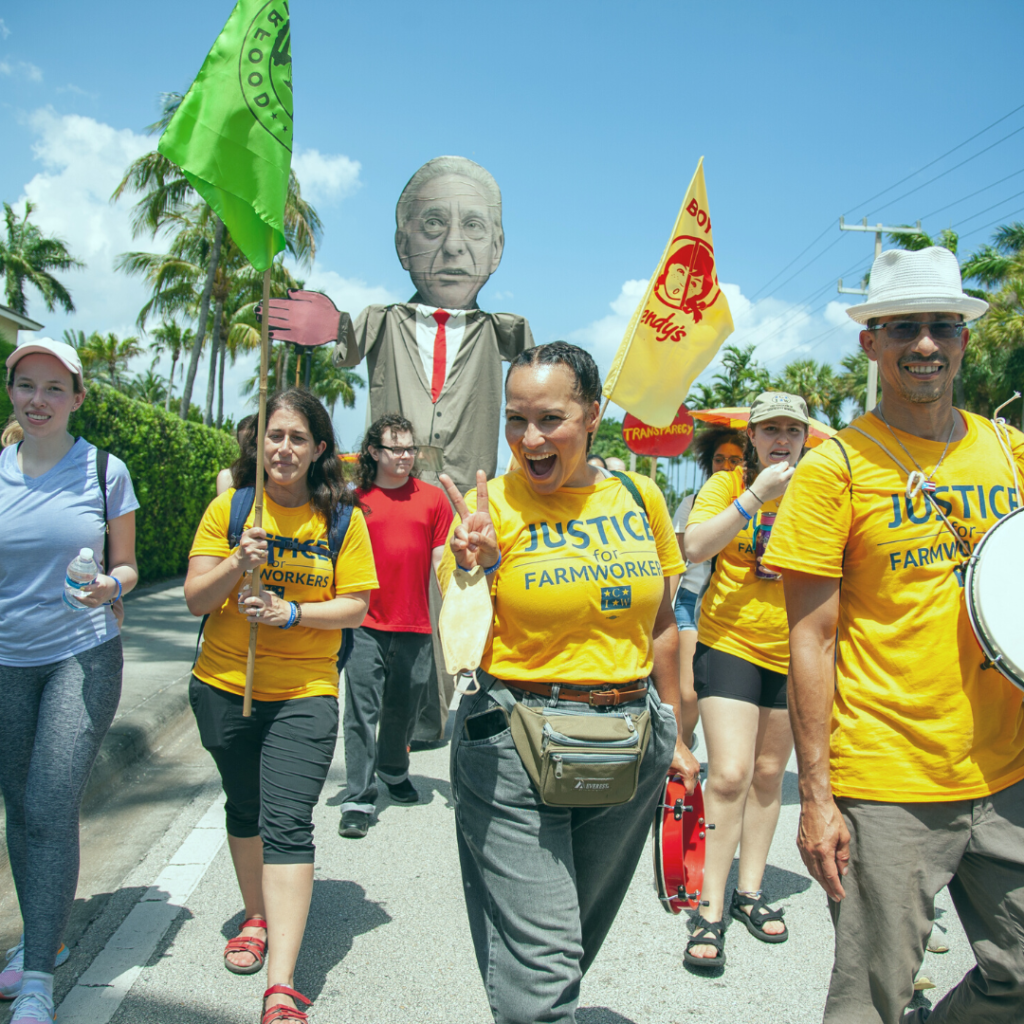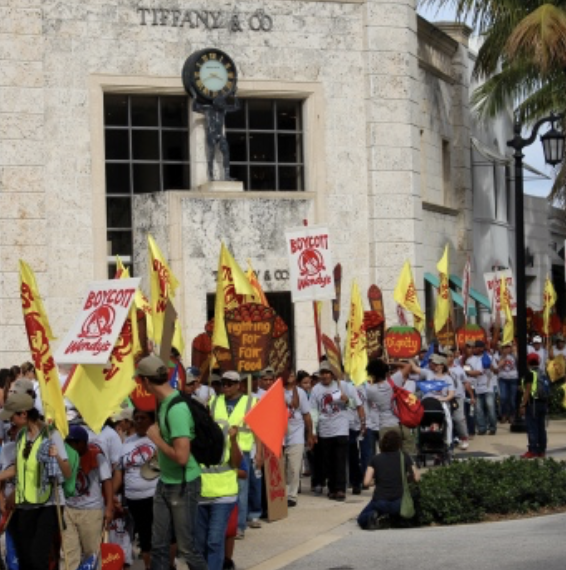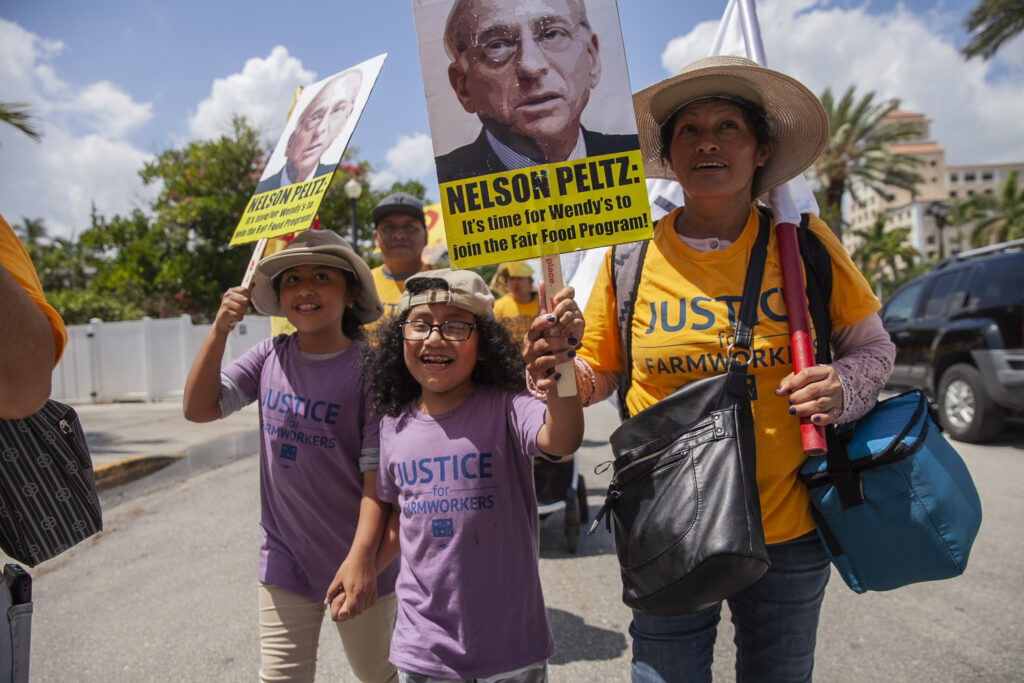
What: A 3-day celebration of farmworkers’ human rights featuring the CIW’s mobile Modern-day Slavery Museum, a benefit concert, and original farmworker theater and art, including a two-story tall, life-like farmworker puppet walking the streets of Palm Beach, giving voice to the country’s farmworker community in their ongoing fight for fundamental human rights
When, Where: March 8-10, 2024, Palm Beach, Florida
Register here by clicking this link
Details: In just under two months, the first-ever Farmworker Freedom Festival will take place in the mansion-lined streets of Palm Beach, Florida, three days of celebration and creative arts highlighting the historic advances in farmworkers’ human rights achieved through the Coalition of Immokalee Workers’ worker-driven, Presidential Medal-winning Fair Food Program – and the long road that remains ahead of expanding those victories to hundreds of thousands of US farmworkers who continue to toil in poverty and abuse.
Over the past several years, the CIW has led inspiring, art-filled, and peaceful marches through the elegant streets of Palm Beach, sparking the public’s consciousness with a powerful message about the longstanding abuses – including sexual harassment and assault, wage theft, and even modern-day slavery – that have haunted our agricultural industry for generations, and about the proven solution to that exploitation, the Fair Food Program. The Harvard Business Review counted the Fair Food Program among the 15 “most important social-impact success stories of the past century,” while the MacArthur Foundation recognized the program with its coveted “Genius Award”, calling the FFP “a visionary strategy… with potential to transform workplace environments across the global supply chain.” In 2015, the Obama Administration awarded the CIW and the Fair Food Program a Presidential Medal in a White House ceremony for its “extraordinary efforts in combatting human trafficking.”
But despite the Fair Food Program’s unprecedented success, many food industry leaders remain opposed to embracing its proven ability to protect vulnerable farmworkers in their supply chains from longstanding abuse. And that is why recent CIW protests have focused on the billionaire enclave of Palm Beach, home to many business and financial leaders with the power – and, thus, the responsibility – to help expand the FFP to new farms and fields, business leaders like Palm Beach resident and Wendy’s Board Chair Nelson Peltz. Indeed, rather than help spearhead the FFP’s expansion to thousands of farmworkers beyond the reach of its protections today, Chairman Peltz has long rejected calls for Wendy’s to participate in the award-winning Program.
This year, farmworkers and their consumer allies will once again arrive in Palm Beach – this time not just for a one-day march, but for three days of events designed to invite the beachfront community into a deeper conversation about the future of the food industry, one rooted in the respect for human rights, not the exploitation of human beings. And that conversation will take place in the language of the creative arts: Interactive visual arts, historical exhibits, music, and theater (Stay tuned for more details on the festival in the weeks ahead!).
 Background: Last year marked thirty years since farmworkers in Immokalee – located just two hours west of Palm Beach, but a world away as measured in wealth and power – first found their voice, coming together to call for an end to generations of poverty wages and violence in the fields. Since its very earliest days, the CIW has employed theater, art, and music as its principal language for sharing the untold story behind our food, both within the farmworker community and with the broader public.
Background: Last year marked thirty years since farmworkers in Immokalee – located just two hours west of Palm Beach, but a world away as measured in wealth and power – first found their voice, coming together to call for an end to generations of poverty wages and violence in the fields. Since its very earliest days, the CIW has employed theater, art, and music as its principal language for sharing the untold story behind our food, both within the farmworker community and with the broader public.
Combining the creative arts with peaceful protest, dogged persistence, and an effective model for change, the CIW – which today is widely heralded as one of the new century’s most successful human rights organizations, both here in the US and abroad – has built a groundbreaking model for protecting human rights in corporate supply chains that harnesses the purchasing power of the food industry’s largest companies to end forced labor and exploitation in the fields across the U.S.
Already, 14 of the world’s largest corporations — including Walmart, McDonald’s, and Burger King — participate in the Fair Food Program, and together with farmworkers and participating growers have forged an unparalleled track record of human rights progress in the fields. As the FFP continues to grow, companies that have yet to join the Program – companies like Wendy’s, Kroger and Publix — represent potential new partners for expanding the FFP’s proven, market-backed enforcement mechanisms to corners of the country’s produce industry where workers have yet to know the benefit of Program’s unique protections, including the greenhouse sector where Wendy’s says it sources its tomatoes.
Wendy’s, however, has instead stood staunchly, and indefensibly, against the Fair Food Program for years, even as reports of exploitation and slavery continue to emerge from its suppliers’ operations. Examples of such reports in recent years include: appalling findings of modern-day slavery at Bioparques de Occidente in Mexico, exposed in a multi-year investigation by the LA Times hundreds of thousands in unpaid back-wages owed to farmworkers in Maine at Wendy’s supplier Backyard Farms; horrifying housing for farmworkers during the height of the COVID-19 pandemic in New York and appalling health and safety conditions faced by workers in Michigan, both on farms under the umbrella of Wendy’s massive greenhouse supplier, Mastronardi.
Wendy’s is not alone, however, in its unconsionable refusal to join the Fair Food Program while claiming to be satisfied with social responsibility measures that clearly are not designed to actually remedy, much less prevent, human rights violations in their supply chains. Just last year, farmworkers and allies from across the country marched 50 miles from the farmworker community of Pahokee, Florida, to Palm Beach, shining a light on the dozens of farmworkers held in forced labor in Pahokee by Bladimir Moreno, who is now serving 10 years in federal prison for his crimes against his employees. According to the US Department of Labor, the watermelons and vegetables picked by the farmworkers under Moreno’s control ended up on the shelves of some of the country’s largest retailers – including supermarket giant Kroger. Indeed, just last week, Kroger was connected to modern-day slavery — yet once again — as detailed by an investigation from The Lever. This marks the third time in the past four years the grocery giant has been linked to an instance of modern slavery when there is a ready-made, proven and highly regarded solution standing in front of Kroger: the Fair Food Program.

Year after year, Wendy’s and Kroger have not only turned a blind eye to the violence, poverty, and exploitation endured by these workers, but have simultaneously turned their back on the only solution that could have prevented the abuse altogether. By committing to preferentially purchase from growers in compliance with the Fair Food Program’s human rights-based code of conduct — and to pull purchases from growers suspended from the program for violations of the code — participating buyers provide the teeth behind the Program’s gold standard protections. Backed by the participating buyers’ purchases, the FFP is the only human rights program in the US produce industry with the power to actually prevent abuse.
That’s why the US Department of Agriculture recently singled out the FFP as the only social responsibility certification program to receive its highest, “platinum” level of recognition for protecting farmworkers’ rights in agriculture. And that’s why companies like Wendy’s, Kroger, and Publix have no credibility when they claim that the audit-based social responsibility measures they rely on to monitor conditions in their supply chains are somehow equivalent to the FFP’s unparalleled enforcement standards.
Two months from today, in the streets and parks of Palm Beach, the Farmworker Freedom Festival will pose this simple question: How much longer will the men and women who harvest our food be forced to face unimaginable abuse when a proven solution is just an agreement away? Farmworkers across the country deserve to work in fields and greenhouses where they no longer have to fear being beaten, raped, or robbed by their bosses, and where consumers know that the workers who picked their produce were treated with dignity and respect. Only when all large buyers of produce are part of the Fair Food Program will freedom and safety for all farmworkers be possible – and in Palm Beach, there is only one person with the power to bring the final fast-food holdout, Wendy’s, to the table.
Register here!
